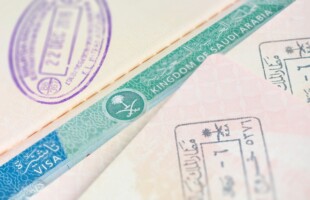In response to the Covid-19 pandemic, Saudi Arabia issued a two-week ban on international flights on 15 March. Many citizens and residents were confident that the ban would be lifted quickly, not yet realising the virus was more than a seasonal flu, and considering the Kingdom’s expertise in handling infections like MERS in the past. However, the ban was partially lifted only six months later, and only citizens and residents with valid visas are now able to return.
In addition to a valid visa and resident permit, migrant residents must have a PCR test to be taken 48 hours prior to arriving in the Kingdom whereas citizens are exempted from this requirement. On arrival, all returnees must quarantine for three days and take a PCR test within 48 hours, at the Ministry of Health.
With conditional return and fewer flights, there are still thousands of migrant residents stranded abroad unsure of their fate. Many of them have taken to public platforms to share their stories and interact with others like them. They have formed their own (virtual) diasporic unity over a shared concern regarding their return to the Kingdom. The twitter accounts for Jawazat, the Ministry of Interior (MOI), Ministry of foreign affairs (MoFA), Absher, Saudia Airlines and GACA are also flooded with pleas from residents who are stuck in different parts of the world.
A quick scan of these accounts in the past few months provides a small window into how the pandemic has scarred and disrupted the lives of Saudi’s migrants in different ways. Most of these stranded migrants are from India, Pakistan, Bangladesh, The Philippines, Egypt, Sudan and other neighbouring Arab countries. Different concerns and desperations engulf them but the most common worry across different groups is that of job loss, which ultimately impacts their residency status under the kafala system. The employment-bound Iqama (residence ID) is subjected to renewal every year. Since the temporary closure of international borders, the Saudi government has extended resident IDs and visas free of charge for those stuck outside the Kingdom which, to some extent, has eased some of these worries. But the question remains how long the government will incur these costs.
Omar, a resident still stranded outside the Kingdom, says, “I came to my home country for a short vacation but got stuck here after Saudi Arabia closed its international borders. In August, my company asked me to resign and said I don’t have to return. I have all my belongings inside the Kingdom. But now I do not have a job there. I want to go but what happens when I get there, I am not sure what to do.”
David expresses similar fears. “There are flights from my home country to Saudi Arabia and I am desperate to get home even if I have to pay thrice the amount of normal fare, but my iqama and exit re-entry expired on 15 September. I have been asking my sponsors to renew it but they say they can’t. But several of my friends in similar situations have got their visas renewed by their sponsors. I really hope the government renews it automatically like they did before because if it is left up to my sponsors I doubt they will ever do it.’’
Omar and David’s fears highlight the underlying vulnerability of the Kafala system, which leaves critical issues at the sponsor’s discretion, and the worker helpless. Other migrants in similar situations expressed uncertainty about how they can claim their belongings given their temporary residence is tied to their Kafeel (sponsors). And while the government did announce some labour reforms for private-sector employees specifically impacted by the Covid-19 crisis, it hardly addresses the precarity of migrant workers.
The current situation coupled with a slew of Saudisation announcements that have taken place in the past few months have aggravated the anxieties for those unable to return. Saudisation entails the replacement of migrant workers by Saudi citizens in certain occupations, and while such policies have been in place for several years now, the impact of the Covid-19 crisis on the job market further accelerated these nationalisation measures.
It is critical that the Saudi government keep migrant workers informed of measures being taken to bring back residents stranded abroad. It should also make clear what processes would be established to claim benefits, dues and clear liabilities in the Kingdom, for those who may not be allowed to return due to job loss. These mechanisms should be bilateral processes involving embassies of countries from which stranded workers hail.
In addition, those like Omar, who have all left behind functional homes will need assistance to wind up. Employers still have a responsibility towards workers who have been laid off due to this crisis.
*Names of all individuals mentioned in this post have been changed.




